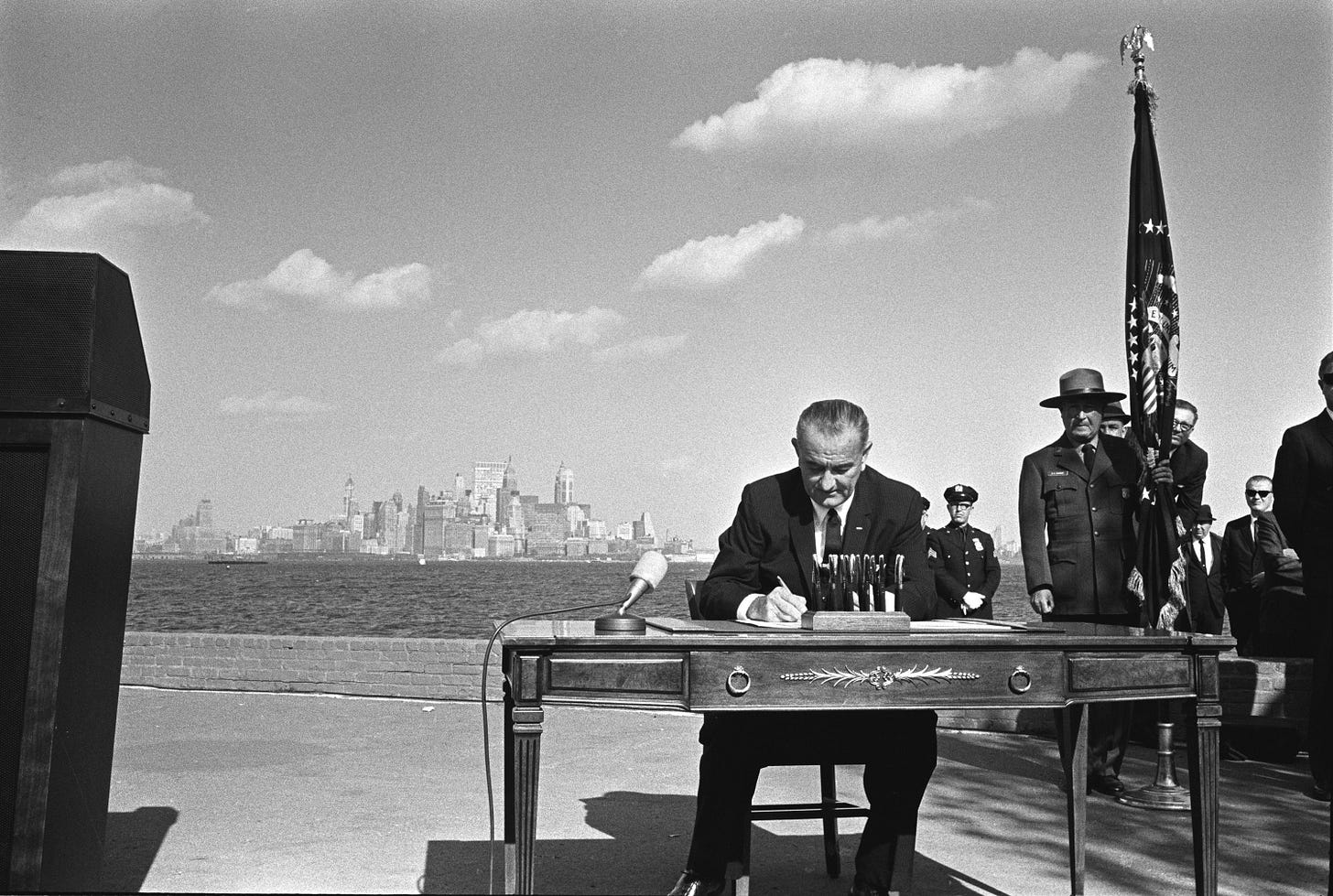This topic will be covered in six parts. This is part 3. Check out
Wrapped in Red, White, & Blue
In the spring of 2008, I was flown to Lincoln, Nebraska, to interview for the presidency of the radio ministry Back to the Bible. Upon arrival, I was given a tour of the facilities, including the television studio where recordings were made.
The environment was casual—coffee tables scattered throughout the space created a relaxed setting for a small audience of staffers. This setup allowed the host, Dr. Woodrow Kroll—the soon-to-retire president—to engage with a live crowd during his broadcasts.
What caught my attention, though, were the Bibles on the tables. They were strikingly patriotic: red, white, and blue.
I have to admit, it unsettled me. Not the Bible version, but the colors.
I understood the intent—to resonate with their American audience. But Back to the Bible was a global ministry, speaking to people far beyond the borders of the United States. And this felt more American than Christian.
It’s not that I don’t love my country—I do, deeply. I cherish the ideals on which it was founded. I love the colors of the American flag. I value the freedoms I’ve been given, and I honor the sacrifices of family and friends who have fought—and even died—to protect them. I understand the beauty of what I’ve received, and I’m profoundly grateful for it.
But I also know, both from personal experience and years of studying missiology, that when the Bible is wrapped in a national flag, the message of the gospel is at risk. It becomes distorted—entangled with a nation’s identity—so that what is meant to be a transcultural, timeless truth begins to sound more like a political slogan. The transformative power of the gospel is too easily co-opted and domesticated by patriotism.
I consider myself a patriot. I love my country enough to want it to live up to its highest ideals. But I separate my patriotism from my faith as much as I can—because I serve a King from an entirely different kingdom (Ephesians 2:19; Philippians 3:20; 1 Peter 2:9).
While I long to see my country flourish, my deepest desire is to see the gospel transform lives across every tribe, tongue, and background. In that, Christian nationalists and I agree with one another, but it’s the mechanism by which that transformation happens that is where we part ways.
A Christian Nation
One of the arguments touted by Christian nationalists is that America was founded as a Christian nation, as they note that many early colonies were Christian with a state religion.1
While true, there was a notable shift in early American history with the move toward religious de-establishment following the First Amendment (1791) and then full state-level disestablishment by the 1830s.
However, Christian nationalists argue that we need to return to having Christianity functioning at a quasi-official level. As Paul Miller notes,
“Historians have often argued that a generic Protestant Christianity served as the de facto established religion of the United States until the 1960s. A Christian nationalist is someone who believes that historical fact is normative for today, that the United States should return to the days of a quasi-official, nondenominational (Judeo-) Christian establishment that privileges Christian norms, values, symbols, culture, and rhetoric in American public life and public policy. They do not advocate repeal of the First Amendment, but they do favor a strongly ‘accommodationist’ interpretation of it in which the government is permitted to favor religion over irreligion, and even favor America’s historically predominant religious tradition (i.e., Christianity) over new or different ones. Christian nationalists believe that the American nation was, is, and should remain a ‘Christian nation’—that America’s identity as a Christian nation is not merely a historical fact but a moral imperative, an ideological goal, and a policy program for the future, which also means that defining the nations religious and cultural identity is rightfully part of the government’s responsibility.2
This requires us to dig deeper into the question: was the United States formed as a Christian nation or a secular one?
The answer is simple: yes and no.
The hybrid-Enlightenment
Strange?
A bit.
Cultural sociologist James Davison Hunter, himself a confessing Christian, explains,
“So, you know, even today you will hear people say, ‘America is a Christian nation,’ especially out of the Christian community. And then you will find many other people, secularists, who say, that’s baloney. America was a secular nation at its founding. And back and forth, they go back and forth.
‘It’s Christian.’
‘No, it’s not.’
‘It’s secular.’
‘No, it’s not.’
Back and forth. And, you know, historians of the stature of a Mark Noll, you know, brilliant historians George Marsden and Harry Stout and others have written about this to try to make these things clear.
The answer is, well, it was both. It’s both. It’s not one or the other.
So now let me step back. We know that the great democratic revolutions of the 18th and 19th centuries were the offspring of this cultural and intellectual revolution called the Enlightenment. Western Europe, North America went through this intellectual cultural revolution called the Enlightenment.
And the offspring of it, the political offspring of it, was this great democratic revolution throughout the nations of Western Europe and North America. But the Enlightenment in France produced the guillotine. It produced the Reign of Terror.
In England, there was warfare beforehand, but it was by the time democracy took shape, it was milder. In Germany, there was the kulturkampf, but in the United States, it was what historians would call a moderate Enlightenment. Why was it moderate compared to France?
Now, Thomas Paine and Thomas Jefferson were very partial, and Benjamin Franklin very partial toward France, much more secular people. But the reason why it was moderate was because it was syncretic.
Think of in the United States, our public culture is like a reservoir that had streams that fed it, and some of those streams. One of those streams was classical Republicanism. Another stream was Lockean individualism. Another stream was Calvinism itself. Jonathan Edwards was an Enlightenment figure, but also an orthodox Calvinist preacher. But he was a man of his times, wrestling with the ideas of his age. And of course, 90% of the population of the colonies at the time of the founding came from England and Scotland and Wales, but mainly England. Certainly its leadership was English, and therefore a lot of it was the dissenters who had descendants of the dissenters in New England. They were the Congregationalists, you know, they were Presbyterians, they were Methodists. Anglicans, of course, had a foothold in Virginia and some other. Other states. But that was all part of what blended into this kind of cultural stew. It was a syncretic Enlightenment. It was a hybrid of many different things.
During the Revolutionary War, the British feared the Calvinist ministers maybe more than anyone else, because they were preaching revolution from the pulpit. The interesting thing about this hybrid Enlightenment was that it was opaque. It was opaque. So even a Thomas Paine, who is probably the most forceful of the kind of representatives of the French Enlightenment, in his pamphlet Common Sense. Common Sense was preached from the Calvinist pulpits all over the colonies, in part because Paine was drawing from biblical imagery, biblical stories, biblical language, biblical symbolism all over the place. It resonated. They didn’t need to know that that Paine himself was.
Was he an atheist or a quasi-atheist, because, again, the language resonated. It was opaque enough that people could read their own traditions within it. Jefferson, of course, created the Jefferson Bible, in which he, with a razor blade, cut out all the references to the supernatural elements of the Gospels and left the ethical Jefferson was aligned with the ethics of Christianity. And oftentimes the more secular revolutionaries were just as puritanical in their ethics as the most Calvinist of Calvinist preachers in their ethics. It’s really quite remarkable. It was a blend.
So, it wasn’t just a secular nation at its founding and it wasn’t just a Christian. It was a hybrid. And part of the success was that people from various traditions could read their own commitments, their own convictions in it. And that was the common culture. It addressed the issues of what is real, how we know it’s real through reason, who is a person, a citizen, a rights bearing citizen, right, the ethics of responsibility to the new republic and the teleology. This is a place in which all things are new. Novos ordo seclorum. Right? Where for the Calvinists, Timothy Dwight believed that Jesus would arrive, come back to earth in America. And yet Franklin and others, they believed a kind of secular eschaton was happening, a kind of human perfection in America. But, but, but both were infused with hope. That was the common culture that united people across differences and in spite of differences and provided the grounds for, for nation building through the end of the 19th, 18th century into the 19th and spilling into the 20th century. It was a belief in the American project, but rooted in that kind of latent cultural infrastructure.”3
Christianity was a significant unifying force in the early American republic, but it wasn’t the only one. Enlightenment ideals also shaped the nation’s identity, and both sets of values were more aspirational than fully realized.
Hunter, in his book, Democracy and Solidarity, explains,
“In America, the strata of social thought that underwrote liberal democracy took shape as a hybrid-Enlightenment, a blending of cultural sources that drew from many different tributaries of thought and practice. As an ethical ideal, the hybrid-Enlightenment was generative and powerful, to be sure, but also greatly flawed.
I argue that within the deep and surface structures of American political culture, there were profound contradictions that have laid bare the inadequacies of America’s hybrid-Enlightenment as a source of liberal democratic solidarity. So much of the story to renew democracy since its founding is a story of the effort to revise, reconstitute, and revivify the hybrid-Enlightenment and the cultural logics that have rendered liberal democracy intelligible and coherent, even against its own weaknesses, contradictions, and failures. I call this a process of ‘working through’ culture.”4
America’s Cultural Reservoir of Civic Religion
It was this Northern European Protestantism that shaped—or at least influenced—the Founding Fathers’ offer of a generalized vision of God: an Americanized Christian deity, so to speak. Each denominational stream brought its theological distinctives, pouring into a shared cultural reservoir that became a unifying ideal for the emerging nation. This reservoir was deliberately vague, allowing successive generations of Christians to project their interpretations of God onto it, believing that the God of the reservoir reflected their particular faith.
This reservoir motif functioned as long as each generation continued to fill it with some form of Protestantism. Religious freedom was a noble principle, but in practice, Christianity—specifically Protestant Christianity—held a privileged place in American public life. The system worked until it was challenged.
Problems arose when individuals or groups who practiced entirely different religions—or even different branches of Christianity—began to challenge the reservoir. Its theological contradictions and cultural disparities, as noted by sociologist James Davison Hunter, became increasingly evident.
Historically, whenever divergent voices sought a place in public life, the boundaries of exclusion became visible, and the privileged position of Protestant Christianity was made plain. Those who did not draw from the dominant cultural reservoir—Indigenous peoples, enslaved Africans, Roman Catholics, Mormons, and Jews—were often excluded from full participation in civic life. While the ideal of religious freedom was enshrined in the Constitution and occasionally upheld in practice, in reality, those outside the framework of Northern European Protestantism were largely denied the opportunity to shape or influence the public sphere.5
These boundaries defined who was considered truly “American” and who was not. Those outside them—cultural minorities—became casualties of a contradiction at the heart of the American ideal: in theory, they were granted inclusion; in practice, they were denied participation.
Yet this contradiction wasn’t widely felt on the national stage, largely because those excluded remained in the minority. The majority controlled the political and cultural oxygen, determining which ideas could breathe. Only those that conformed to the dominant norm were allowed to flourish.
For almost 200 years, this continued with Protestantism providing the primary source for replenishing the American civil religion. But the time was changing, and there were several cultural developments that started to challenge Protestantism’s spiritual hegemony. It’s beyond the scope of this article to address all of the developments, but one is of particular interest for today’s article—the Immigration and Nationality Act of 1965.
Multiculturalism Arrives
Before 1965, U.S. immigration was governed by a quota system (established in the 1920s) that heavily favored immigrants from Northern and Western Europe (and enabled the cultural reservoir to be continually replenished), while severely restricting immigration from Asia, Africa, and parts of Southern and Eastern Europe. But the Immigration and Nationality Act triggered the largest wave of religious diversification in American history. No longer was Protestantism the only faith in town.
Immigrants from various countries brought their faiths and traditions with them—Islam, Roman Catholicism, Hinduism, Eastern Orthodox, Buddhism, Sikhism, Jainism, Zoroastrianism, and Baha’i. No longer were their houses of worship confined to faraway lands, but rather in the urban and suburban cities of America. Their arrival provided a dramatic boost for pluralism and significantly challenged the cultural reservoir of civic religion. Public institutions had to accommodate diverse religious practices, from dietary laws to religious holidays.
The religious hegemony that Protestant Christianity had for much of American history has declined dramatically with increased multiculturalism that no amount of immigration reform is going to stop, despite political tactics.
Such realities are largely overlooked by Christian nationalists, who want to return to an idealized view of the American past where Protestant Christianity had a privileged position. Their desire is based on a perceived (and real) loss of familial and cultural identity. However, that identity was not biblical; it was the identity imposed upon the opaque cultural reservoir.
As a Christian, my responsibility is to glorify God in all that I do and to proclaim the excellencies of His kingdom through His Son, Jesus Christ. This means loving my neighbor, persuading, pleading, and entreating all people to be reconciled to God, and living in a way that demonstrates Christ’s lordship over all of life. That is both my calling and my commission to advance the gospel through loving, listening, serving, sacrificing, suffering, and if need be, dying.
What Christian nationalists often miss is that the Kingdom of God is not brought about through the power of the state. Christian nationalism appears less concerned with advancing the gospel and more intent on using the state as an instrument to enforce cultural conformity to a particular vision of how the world should work, thus guaranteeing their privileged position. In doing so, it becomes its own form of identity politics, as Paul Miller describes,
“Christian nationalism is, in effect, identity politics for tribal evangelicals who confuse their particular culture for the nation as a whole. Evangelicalism, when it indulges in this kind of political engagement, is acting less like a religious community seeking to embody the universal faith than one among many particularistic or tribal ethnoreligious sects lobbying for power and prestige. In short, nationalism, considered as a political theory, is arbitrary, incoherent, and illiberal. If taken to its logical conclusion, nationalism undermines the foundations of a free and open society, including religious freedom and racial or ethnic pluralism. I also show that Anglo-Protestant culture is not necessary to sustain the political institutions of liberalism and democracy. In chapter six I review ‘nations’ and ‘peoples’ in the Bible, critique nationalists’ misuse of the Bible, and discuss how Christians today should think about ‘the nations’ and about ancient Israel. I suggest that nationalism, in its ideal form, is a kind of idolatry.”6
Miller is more academic and gracious in tone, but Russell Moore is more direct,
“Christian nationalism is not a politically enthusiastic version of Christianity, nor is it a religiously informed patriotism. Christian nationalism is a prosperity gospel for nation-states, a liberation theology for white people. In that it has more in common with the lifeless establishments, the old liberalisms, and some of the social gospels, which preferred a gospel that changed externals and did not demand personal repentance and faith. It submerges personal transformation under social transformation, thus making both impossible.”7
Moore continues,
“Of the blood-and-soil impulses of such movements as Christian nationalism we must ask what’s underneath? As the sociologist Peter Berger noted about the human motives for the kind of collectivism we see here and elsewhere: ‘The entire collectivity, bound together by ties of blood, thus becomes (to its own self-understanding) quite concretely immortal, for it carried with it through time the same fundamental life that is incarnate in each of its members.’ They are seeking a canopy of protection—from death, from shame, from guilt, from humiliation—in the group. This quest is for everlasting life—a life seen in the ongoing life of the tribe, not the person. This is precisely the mindset John the Baptist bulldozed when he said, on the banks of the Jordan: ‘And do not begin to say to yourselves, ‘We have Abraham as our father.’ For I tell you, God is able from these stones to raise up children for Abraham’ (Luke 8:38). The question is the same as it always was, ‘Teacher, what shall I do to inherit eternal life?’ And when told to love God and neighbor, the rejoinder is as it often is, ‘And who is my neighbor?’ (Luke 10:25, 29). Just as in Jesus’ inaugural sermon, the message of freedom, liberation, and anointing is received with jubilation, as long as it is thought to apply to the already-existing national or ethnic or kinship categories, but when told that the ways of God reach beyond all that, to the Gentile widow and the Syrian soldier, the jubilation gives way to rage (Luke 4:16-30).”8
Much of what Moore wrote is right, except that Christian nationalism is not limited to white people only;9 it does redefine the Christian message as a means of holding on to cultural power.
Is it really a pursuit of eternal life? Not in the biblical sense, it’s not. And in order to get that kind of life, it requires a certain kind of cultural authority that enables them to be boundary markers of determining who and what is good and acceptable, and what is not.
Conclusion
Christian nationalism is, at its heart, a dangerous nostalgia. It longs not for the kingdom of God, but for a bygone era of cultural supremacy—a time when Christianity, or at least a certain brand of it, occupied the center of American life.
The gospel does not need a favored seat at the table of cultural power to flourish. It often shines brightest from the margins.
Jesus never told us to take back a nation—He called us to take up our cross.
He called us to love our enemies and make disciples of all nations.
We can love our country deeply without syncretizing it with our faith.
Patriotism has its place—but must never displace our first allegiance. Our citizenship in heaven does not erase our earthly responsibilities, but it does define our ultimate loyalties and shape how we engage them.
We must remember that the kingdom Jesus proclaimed isn’t built on political power or preserved by public policy. It grows not through control but through changed hearts, humble love, and faithful witness.
Christian nationalism may feel like strength, but it’s a strength that comes at the cost of Christian witness. And when that happens, the power of the cross gets obscured by the flag draped over it.
As followers of Christ, we’re not just citizens of an earthly nation—we’re ambassadors of a kingdom that is not from this world (John 18:36; 2 Corinthians 5:20). That’s where our true allegiance lies. And that’s the hope we offer to a divided world: not a return to some imagined past, but a future shaped by the love, truth, and grace of Jesus.
Next time, we’ll uncover the historical patterns of Christian expansion—and how they expose the deep flaws in the Christian nationalist vision.
Schaetzel, “The Christian Nationalist Declaration,” in A Biblical Guide to Taking Dominion and Discipling Nations, xx-xxi.
Paul D. Miller, The Religion of American Greatness, 4.
James Davison Hunter, “#247 | Building Unity Amid Polarization: Calling You Deeper Than Media Headlines with James Davison Hunter, Pt. 2”, Those Who Serve the Lord podcast, March 18, 2025.
James Davison Hunter, Democracy and Solidarity (New Haven: Yale University Press, 2024), 15.
Ibid.
Paul D. Miller, The Religion of American Greatness, 6.
Russell Moore, Losing Our Religion, p. 117.
Moore, 119-120.
James Davison Hunter says, “Christian nationalism wasn’t just white, it was also black. That’s a really important point to make, in part because it was embedded within a theologically rich eschatology, a theologically rich view of the nation.” “#247 | Building Unity Amid Polarization: Calling You Deeper Than Media Headlines with James Davison Hunter, Pt. 2,” Those Who Serve the Lord podcast, March 18, 2025.




